|
|
|
Sort Order |
|
|
|
Items / Page
|
|
|
|
|
|
|
| Srl | Item |
| 1 |
ID:
089116
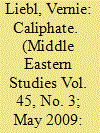

|
|
|
|
|
| Publication |
2009.
|
| Summary/Abstract |
The Caliphate was abolished 85 years ago; there have been several attempts to resurrected it since. What is the potential for a restoration of the caliphate? A new caliphate was declared in Ramadi in mid-2006 by Islamic insurgents before being quickly crushed by the Iraqi government. Just what exactly is a caliphate, who says there is one or who wants one (for example, both the Americans and Islamists have views on the caliphate) and the ideological justifications for one. Where and how did the caliphate begin, what are the prerequisites to be caliph (according to Muslim sources) and were or are there troubles in the succession? Has there been more than one caliphal dynasty? Who are the heirs, pretenders and illegitimate claimants? Where do such families such as the Moroccan Alaouite royal family, the House of Osman, the exiled-Nizamat of Hyderabad and the Hashemite dynasty of Jordan fit in? Despite there not being a 'legally' recognized Caliphate today, there are existing proto-caliphate structures, such as the Arab League and the Organization of the Islamic Conference. There are also legitimizing legal foundations, such as declarations recorded by the 1926 al-Azhar Caliphate Conference, enabling the possibility of a modern restoration of a caliphate.
|
|
|
|
|
|
|
|
|
|
|
|
|
|
|
|
| 2 |
ID:
147597


|
|
|
|
|
| Summary/Abstract |
This article offers a descriptive analysis of the propaganda activities of Al Qaeda in the Islamic Maghreb on Internet social media. It examines the group's propaganda actions from its creation in 1998 until the end of 2015 and argues that the use of social media, Twitter in particular, has failed to offer any real remedy to its mediocre propaganda actions. During the period in which its Twitter profiles were active, the organization continued to manifest the same problems, including a shortage of qualified human resources and poor internal coordination, which had prevented it from engaging in efficient propaganda activity previously. The study of the social media experience of the group offers further evidence of the vulnerabilities of this Maghrebi jihadist organization.
|
|
|
|
|
|
|
|
|
|
|
|
|
|
|
|
| 3 |
ID:
082673
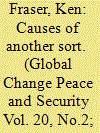

|
|
|
|
|
| Publication |
2008.
|
| Summary/Abstract |
The Islamic caliphate is a key competitor in the global ideological marketplace. Indeed, it has been called 'one possible configuration for a post-industrial politics' (Philip W. Sutton and Stephen Vertigans, 'Islamic "New Social Movements"?: Radical Islam, Al-Qa'ida and Social Movement Theory', Mobilization 11, no. 1(2006): 105). What is its nature? The answer illustrates the argument that the relationship between the informal conception of collective identity and its non-agentive interest in formal establishment is the ontological basis of international relations. This points the way toward resolution of the agent-structure problem with reference to evolutionary theory. Distinguishing between action and behaviour on the basis of subjecthood is useful, showing that actors' primary interest is self-identification through affirmation of an institutional ideal-state. Such ideational objects do not act, but those through which agents successfully constitute and affirm themselves are more likely to prosper strategically. The caliphate is one such. Thus, conceptions of collective identity behave, compete and evolve.
|
|
|
|
|
|
|
|
|
|
|
|
|
|
|
|
| 4 |
ID:
160567
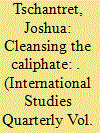

|
|
|
|
|
| Summary/Abstract |
Why do insurgents target certain groups for extermination? Despite a great deal of attention to the targeting of civilian ethnic minorities, comparatively little scholarship exists on insurgent violence against sexual minorities (lesbian, gay, bisexual, or transsexual individuals). This article maintains that the decision to target sexual minorities follows three distinct logics: two strategic and one ideological. First, insurgents face an incentive to outbid rivals by targeting sexual minorities when homophobic violence is politically and socially legitimated. Second, territorial control creates an incentive for insurgents to signal their ability to selectively punish, which they can accomplish through homophobic violence. Third, revolutionary ideologies provide legitimation for exclusionary violence in the pursuit of transforming society. Statistical analysis of insurgent violence against sexual minorities from 1985 to 2015 lends strong support for these arguments. Process tracing of the spread of violence against sexual minorities in Iraq and Syria clarifies the strategic causal mechanisms. When progovernment militias targeted perceived homosexuals with impunity, antigay violence was adopted by insurgent groups seeking to legitimize their claims to power; violence then quickly spread to competing insurgents. Two additional cases from Latin America demonstrate that ideology plays an important role in influencing which groups embrace homophobic violence even under these strategic constraints.
|
|
|
|
|
|
|
|
|
|
|
|
|
|
|
|
| 5 |
ID:
140458
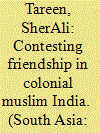

|
|
|
|
|
| Summary/Abstract |
This essay examines competing understandings of ideal publics in modern South Asian Islam by analysing a polemical debate among Muslim scholars about the boundaries of friendship between Muslims and non-Muslims. The specific context of this polemic was the pan-Islamic Khilafat movement and concomitant debates on the limits of friendship between Muslims, the British and Hindus. Through a close reading of this polemic, I show ways in which Muslim normative sources are mobilised and interpreted for radically contrasting ideological and political projects. The specific focus of this essay is on intra-Muslim contestations surrounding the category of muwalat (friendship or clientage), and it shows the opposing ways in which this category was approached by Indian Muslim scholars as either friendship between different religious communities or in terms of a citizen's relationship to a modern state. These varied understandings of muwalat, I argue, corresponded to diverging imaginaries of a moral public. This essay particularly focuses on the thoughts of the towering Indian Muslim scholars, Ahmad Raza Khan (d. 1921) and Abul Kalam Azad (d. 1958).
|
|
|
|
|
|
|
|
|
|
|
|
|
|
|
|
| 6 |
ID:
106547
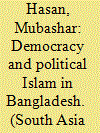

|
|
|
|
|
| Publication |
2011.
|
| Summary/Abstract |
This article examines the deeply contested approaches of 'political Islam' towards modern democracy in Bangladesh, the third largest Muslim country in the world, where sharia law is not the source of public law and where a democratic government is in place. Selecting the political manifestos and constitutions of three different influential Islamist parties, the Jamat e Islami Bangladesh, Hizbut Tahrir Bangladesh and Jamatul Mujahedeen Bangladesh, the study examines through discourse analysis why Islamists take such a hostile approach towards democracy. At first sight, Islamists desire the establishment of an alternative governing system, such as the Caliphate, to replace the present parliamentary system of governance in Bangladesh. Islamists also advocate a change of state philosophy from 'People's Republic of Bangladesh' to an 'Islamic State', arguing that sharia should be the legal framework of the country. The key finding of this research, however, is that Political Islam in Bangladesh is also perceived as a reaction to globalisation and that this global aspect, in theory and practice, may be more powerful as a reactive agent than local/national politics.
|
|
|
|
|
|
|
|
|
|
|
|
|
|
|
|
| 7 |
ID:
166771
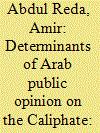

|
|
|
|
|
| Summary/Abstract |
What are the determinants of public opinion on the issue of the Caliphate in the Arab world? My answer to this question outlines the key role played by Islamist elites, religiosity and age in influencing Arab opinion on the issue of the Caliphate in three countries during the early Age of Islamism (1980s–1990s). I do so by using Binary Logistic Regression Models on observations that I found in survey data collected in 1988 in Egypt and Kuwait, and an Ordinal Logistic Regression Model for data collected in Palestine in 1995. My results suggest that elites play a key role in spreading Islamist ideas in Egypt and Palestine, while age and religiosity are most salient in Kuwait.
|
|
|
|
|
|
|
|
|
|
|
|
|
|
|
|
| 8 |
ID:
137561
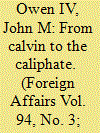

|
|
|
|
|
| Summary/Abstract |
Nearly a century after it first emerged in Egypt, political Islam is redefining the Muslim world. Also called Islamism, this potent ideology holds that the billion-strong global Muslim community would be free and great if only it were pious—that is, if Muslims lived under state-enforced Islamic law, or sharia, as they have done for most of Islamic history. Islamists have long been confronted by Muslims who reject sharia and by non-Muslims who try to get them to reject it. At times benign and at times violent, these confrontations have fueled the revolutions in Egypt in 1952 and Iran in 1979, the al Qaeda attacks in 2001, the Arab Spring of 2011, and the rise of radical Islamist groups such as the self-proclaimed Islamic State (also known as ISIS).
|
|
|
|
|
|
|
|
|
|
|
|
|
|
|
|
| 9 |
ID:
144713
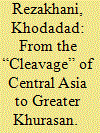

|
|
|
|
|
| Summary/Abstract |
The history of Central Asia is normally considered peripheral to those of the civilizations that surrounded it—Marshal Hodgson termed it a civilizational “cleavage.” However, in the early Islamic period this region, particularly its southern and western parts, emerges as the dominant entity of Greater Khurasan to play a central role in the affairs of the Islamic Caliphate. This paper considers the history of the region, dubbed East Iran, before this rise to importance and proposes a different historiographical approach focusing on the developments in East Iran during the period of late antiquity and in interaction with the Sasanian Empire. It is proposed that the Greater Khurasan emerged as the result of the merging of the socio-cultural worlds of East Iran and that of the Sasanian Empire.
|
|
|
|
|
|
|
|
|
|
|
|
|
|
|
|
| 10 |
ID:
147714
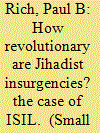

|
|
|
|
|
| Summary/Abstract |
This paper examines the rise of ISIL in the context of wider debates in the first half twentieth century on the nature and political direction of the early Bolshevik state model of Lenin, Trotsky, and Stalin. It argues that there are some parallels between the Trotskyite internationalist tendency in Soviet Russia and of ISIL given the latter’s calls for revolutionary jihad against both ‘apostate’ states in the Islamic world and, in the longer term, against the Western world as a whole. ISIL though is distinguished by its attempt to carve out a new state formation of its own in parts and Iraq and Syria, a project that may well end in failure. However, even if its so-called caliphate fails, it cannot be expected to vanish from the scene since it can either re-emerge elsewhere in a region of weak or failing states or merge with its current rival Al Qaeda.
|
|
|
|
|
|
|
|
|
|
|
|
|
|
|
|
| 11 |
ID:
150082
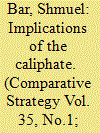

|
|
|
|
|
| Summary/Abstract |
Regardless of the outcome of the military campaign, the “Islamic State” is a watershed. Its regime derives from the personage of the Caliph as the “Substitute of the Prophet of Allah” and “Commander of the Believers.” But it seeks not to restore the model of previous Caliphates, but to resurrect the regime of the Prophet who spread Islam “with the sword” so that “the word of Allah becomes supreme.” The Caliphate paradigm is incompatible with tolerance of heterodox Muslim communities or non-Muslim citizens or with peaceful relations with other Muslim states or the non-Muslim world. It precludes a “Westphalian” order; will exacerbate the Sunni–Shiite conflict, radicalize Muslim communities across the globe, fan the flames of Islamist terrorism and will give birth to “Caliphate Archipelagos”—small groups that swear their loyalty to the Caliph and are willing to act in his name in their territories.
|
|
|
|
|
|
|
|
|
|
|
|
|
|
|
|
| 12 |
ID:
151873
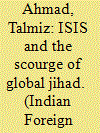

|
|
|
| 13 |
ID:
158975
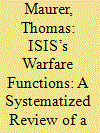

|
|
|
|
|
| Summary/Abstract |
This article gives an overall assessment of ISIS’s conventional conduct of combat operations by examining their warfighting functions patterns. In sum, the approach of ISIS comprised fundamental principles: their weapons can be organized into categories, purposeful combination of these forces in keeping with the concept of combined arms combat, and hierarchical command and control executed by experienced commanders. ISIS combat groups combined the elements of formation and firepower as well as movement and mobility. The paper concludes that ISIS obviously had a vast range of conventional capabilities at its disposal and was thus able to conduct major operations.
|
|
|
|
|
|
|
|
|
|
|
|
|
|
|
|
| 14 |
ID:
167756
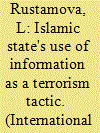

|
|
|
|
|
| Summary/Abstract |
ISLAMIC STATE (IS, an organization banned in Russia and also known as the Islamic State of Iraq and Syria or ISIS and the Islamic State of Iraq and the Levant or ISIL) became an actor in world politics quite recently but showed its nature as a threat to international peace and security as soon as it came onto the global political scene. Some scholars, among them Jessica Stern, J.M. Berger,1 Georgy Mirsky,2 Stephen Walt,3 and Alexey Volynets,4 see IS as a state-like entity because it does possess (although the past tense would be more appropriate) basic characteristics of a state - it controls a populated territory, has a government system similar to that of any modern state, and maintains relations of some kind with other states.
|
|
|
|
|
|
|
|
|
|
|
|
|
|
|
|
| 15 |
ID:
045046
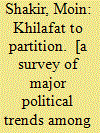

|
|
|
|
|
| Publication |
New Delhi, Kalam kal, prakashan, 1970.
|
| Description |
xi, 300p.Hbk
|
|
|
|
|
|
|
|
|
|
|
|
Copies: C:1/I:0,R:0,Q:0
Circulation
| Accession# | Call# | Current Location | Status | Policy | Location |
| 004682 | 954.035/SHA 004682 | Main | On Shelf | General | |
|
|
|
|
| 16 |
ID:
146776
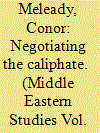

|
|
|
|
|
| Summary/Abstract |
This paper considers two aspects of historiography about the 1967 Arab–Israeli War – American and Soviet foreign policy in the region – to better appreciate the Soviet role in the outbreak of hostilities, as well as how the war concretized the US–Israeli ‘special relationship’ and weakened American–Arab relations. Relying especially on research from the Lyndon Johnson Presidential Library and Foreign Relations of the United States, this paper argues that Soviet officials had little interest in pursuing measures to prevent war during the pre-war crisis because the situation promised to undermine American interests in the region.
|
|
|
|
|
|
|
|
|
|
|
|
|
|
|
|
| 17 |
ID:
077335
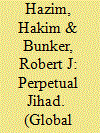

|
|
|
|
|
| Publication |
2006.
|
| Summary/Abstract |
Many Sunni and Shiite groups have embraced a more radical version of Islam spawned by Al Qaeda. Those who adhere to this version view the struggle within Islam and against the West as a perpetual jihad ordained by God until a just caliphate emerges. Their jihad must be viewed through the lenses of eschatology. This view focuses on the five prophetic stages of Islam. Four of these stages have come to pass with a future stage to result in the rise of the caliphate and the return of the Mahdi. In order to fulfill this fifth stage, Al Qaeda and other Sunni and Shiite networks are actively promoting jihad activity.
|
|
|
|
|
|
|
|
|
|
|
|
|
|
|
|
| 18 |
ID:
174167
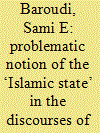

|
|
|
|
|
| Summary/Abstract |
This article examines the conceptualization of the 'Islamic state' by one reputable Arab Islamist scholar, Muhammad Abu Zahra. It contends that he fails to provide internally consistent answers to four key questions. First, does the Islamic state presently exist, or is it yet to be established; and if the latter is the case then by whom and how? Second, was the historic caliphate which allegedly extended from the death of the Prophet until the Ottoman caliphate’s dissolution an 'Islamic state'? Third, is the 'Islamic state' universal in scope, or can there be several Islamic states at the same time? Fourth, what is the relationship between the 'Islamic state' and Islamic unity; and can the latter be achieved outside the context of the 'Islamic state'? I argue that Abu Zahra’s conceptualization of the 'Islamic state' is heavily influenced by 'modern'/European ideas about the nation-state; as a sovereign entity with the authority to impose its writ over its citizens and territory. I conclude that the 'Islamic state' is a stillborn idea being a hybrid of two highly incompatible sets of genes: the Islamic tradition, which does not conceive the Umma in territorial terms, and the 'modern'/ European notion of the territorial state.
|
|
|
|
|
|
|
|
|
|
|
|
|
|
|
|
| 19 |
ID:
158395
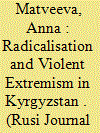

|
|
|
|
|
| Summary/Abstract |
In this close analysis of radicalisation and violent extremism in Kyrgyzstan, Anna Matveeva argues that radicalisation is not a myth but a phenomenon taking root in the region. While the drivers of radicalisation are not entirely understood, its geographic and social patterns have become clearer. In Kyrgyzstan, it positively correlates with belonging to a Muslim minority group, and their representatives find jihadi ideas more attractive.
|
|
|
|
|
|
|
|
|
|
|
|
|
|
|
|
| 20 |
ID:
090203
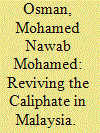

|
|
|
|
|
| Publication |
2009.
|
| Summary/Abstract |
Operating in over 43 countries in the world, Hizbut Tahrir (HT) is presently active in Europe, the Middle East, Africa, and more recently in Asia. Today, HT is becoming increasingly prominent in Southeast Asia, especially in Indonesia and Malaysia. Yet despite its rapid growth in the region, little is known about HT chapters in Southeast Asia, especially in Malaysia. In light of the dearth in scholarship on Hizbut Tahrir Malaysia (HTM), this article aims to shed some light on the HTM and analyze the likelihood of its emergence as a political force in the country.
|
|
|
|
|
|
|
|
|
|
|
|
|
|
|
|
|
|
|
|
|